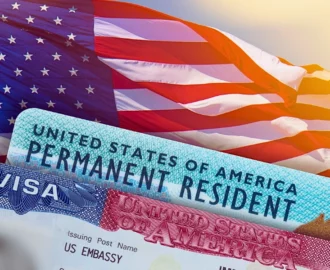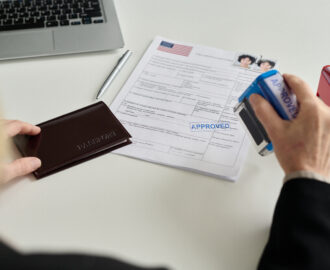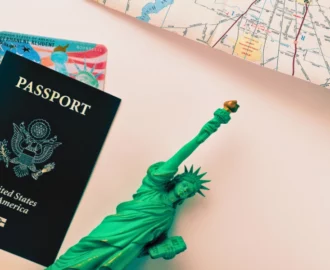An experienced immigration attorney could help ease the legal residency process in numerous ways, such as assessing eligibility, providing strategic legal advice, preparing documentation, and submitting your application. With the right attorney working with you, you can increase your chances of successfully completing the legal residency application process.

To learn whether you can apply for legal residency, call 312-853-3088 to speak with the experienced Chicago green card attorneys at Cho Immigration Law.
How an Immigration Lawyer Simplifies the Legal Residency Process
A growing number of people are applying for and obtaining lawful permanent resident status (LPR) in the United States. According to the Office of Homeland Security Statistics, there were around 12.8 million LPRs in the U.S. as of January 1, 2024. However, the legal residency process can be a challenge to navigate. To successfully apply for legal residency, you must ensure all documentation is correct and contains consistently accurate information.
Here are some of the ways a Chicago green card lawyer may be able to help you with the residency application process:
Determining Eligibility
The first way an immigration lawyer could assist with legal residency applications is by confirming whether you qualify for LPR status.
Some of these eligibility requirements in Illinois include:
- A physical presence within the state
- Intent to remain within the state as a resident
- Intent to return to the state following travels outside
- Domicile within the state for one full year
To prove these items, you must also have plenty of supporting documents.
Providing Strategic Legal Advice
Another area where a reliable immigration lawyer can help is by providing strategic advice that’s unique to your case.
For instance, some individuals may need guidance on applying for U.S. residency with a DUI or another crime on their record. You may also need help with the appeals process if the government denies your application, or assistance with reapplication.
A good attorney will look at all the facts of your case to provide tailored representation based on your requirements. In turn, you can rest assured that your case is in good hands and that you’re taking the right approach to obtain legal residency or another immigrant status.
Preparing the Necessary Documentation
There are many documents that you’ll need to help you with the residency application process in Illinois, including a valid Illinois driver’s license, high school or college transcript, state or federal tax return or transcript, auto registration cards, and more.
Additionally, you’ll need to complete Form I-485, Application to Register Permanent Residence or Adjust Status. All the information on this form must match your supporting documents and be entirely accurate, or you could wind up with a denial.
An immigration lawyer will be able to help you complete, organize, and ensure the accuracy of all documentation involved in the legal residency process.
Ensuring Compliance With Relevant Regulations
When completing the application process, you’ll need to comply with various state and federal laws and regulations. For example, you must have lived in the state where you want to gain residency for at least 12 months before applying for legal residency.
In helping you establish residency, your lawyer could advise you on how to register motor vehicles, obtain a valid driver’s license, or acquire other documentation to support your application.
Submitting Your Application and Monitoring Progress
After completing all necessary forms and preparing supporting documentation, your attorney could ultimately help you submit your application. Following the submission, he or she could also keep track of the entire process to indicate how long it will take to complete. In turn, you’ll be informed regarding the progress of your application.
Understanding Your Options for Visa and Green Card Applications
Depending on the situation, there are many types of visas and green cards that immigrants can obtain. The following are some types of visa and green card applications you may seek:
Family-Based Green Cards
If you have a relative in the U.S. who is a current green card holder or U.S. citizen, this individual may be able to sponsor you to help you get a family-based green card. Sponsors must be immediate relatives of the applicant, which may include spouses, children under 21, parents, or siblings.
Employment-Based Visas
Employers may also sponsor employees to enable them to live and work in the U.S. for a limited time. These visas may apply to immigrants or non-immigrants seeking employment in various capacities, such as individuals with specialized skills, athletes, artists, and other qualifiers.
Asylum and Refugee Status
If you face persecution on returning to your country of origin due to discrimination based on certain protected characteristics, you may be able to seek asylum in the U.S. Refugees can apply for asylum in the U.S. while in their home country and proceed to enter the U.S., while asylees can apply while currently in the U.S.
How Long Does It Take to Become a Legal Resident?
The amount of time it takes to obtain legal residency in the U.S. depends on certain factors, including the type of application you submit, application backlog, and other influencing elements. For example, it usually takes at least a year to petition for lawful permanent resident status with an adjustment of status request. If you’re outside the U.S. and petition for LPR status, this process could take anywhere from a few days to several months.
Generally, you should prepare for a potentially long process, but working with an attorney could help shorten it considerably. The right attorney can ensure all information is correct, that you file on time, and that your application moves through the necessary channels as needed.
When consulting with an attorney, you should get a better idea of the length of time it will take to complete the application process and what you can do in the meantime, such as taking steps to ensure a smooth and successful transition to life in America with your family.
Avoiding Common Pitfalls in Residency Applications
When applying for LPR status in the U.S., it’s important to know what challenges you may face along the way and how to avoid them. Here are some of the key reasons immigration applications are denied by U.S. Citizenship and Immigration Services (USCIS) and other government agencies:
Ineligibility
You must ensure you qualify for a visa or green card before applying. Specifically, you may not be physically present in Illinois or the other state where you want to apply for residency. You must also show that you intend to remain in the state and have only one legal residence at any given time.
Incomplete or Inaccurate Information
On Form I-485 and other immigration documents, you must include accurate and up-to-date information. Any inconsistencies or inaccuracies could lead USCIS to reject your application. An attorney could review and help complete your documents to confirm that all information is current before submitting your application.
Insufficient Supporting Documentation
You’ll need a variety of documents to prove eligibility for residency, including a driver’s license, proof of residency, and more. Failure to gather and organize these documents could make it harder to show that you qualify and subsequently lead to a denial.
USCIS Denies Petitions
If you’re seeking LPR status with the help of an employment- or family-based visa or green card, USCIS could deny your or your sponsor’s petition. For instance, while USCIS may not find any issues with your Form I-140 when seeking an employment-based visa, your employer could make a mistake during the process as he or she fails to establish a working relationship with you. All parties involved in the application process should ensure that all documentation is consistent to keep it smooth and efficient. Here is where an immigration lawyer could also help.
Failure to Attend Appointments
USCIS may also deny your application if you fail to appear at necessary scheduled appointments. For example, you will need to interview at some point with an immigration officer before completing the application process. Additionally, you will need to make a biometrics appointment to submit your fingerprints and other data to qualify you as a resident.
If you don’t appear at these interviews and appointments, you may not be able to finish the process. An attorney can help you make all necessary appointments and even represent you during the interview process in your presence.
Errors on the Part of USCIS or Consulates
In some cases, USCIS may wrongfully deny an application because of errors that either this agency or an applicant’s consulate makes during the residency process. A lawyer could review all documentation following a denial to determine if these parties made an error. He or she could then help you appeal the decision and explain the error to help increase the chances of subsequent approval.
Low Income
USCIS is likely to deny an application if the applicant doesn’t have enough financial resources to successfully live and contribute to the state and the country. In family-based applications, both the applicant and the sponsor must have sufficient finances to back them.
Criminal Activity or Deportation
If you have a history of serious crimes or receive a conviction during the immigration process, this could render you ineligible for LPR status. A history of deportation and immigration law violations could also severely hinder your chances of successfully applying for residency.
Health Reasons
Before qualifying for LPR status, you must undergo a medical exam with a licensed physician to assess your health. The government may deny your application if you pose a health risk to yourself or others involving:
- Communicable diseases
- Inadequate vaccination
- Mental or physical disorders
- Substance abuse or addiction
Why Hire an Immigration Lawyer for Assistance?
If you’re new to the LPR application process or simply want to ensure the process goes well, you’ll benefit from hiring an immigration attorney. A good attorney will give you the guidance needed to complete and submit all necessary documentation.
Handling All Paperwork
Immigration cases frequently involve a lot of paperwork, including forms and supporting documentation. If you don’t have the resources to handle all of this paperwork on your own, a lawyer can simplify the process and keep all information accurate and current. As a result, you can focus on planning your life within the U.S. while your attorney takes care of the more menial tasks.
Representation During Hearings
If you need to appear in court hearings regarding your immigrant status for any reason, a lawyer could represent you during this process, potentially helping you avoid removal and deportation in extreme cases. Having a lawyer present is particularly important if you need help communicating with English speakers, as a good attorney will be bilingual or multilingual to help with translation and communication.
Knowledge of Most Immigration Law Topics
Reliable immigration attorneys will also know about immigration laws, regulations, and processes to help you in nearly any case, with the ability to guide you on how to become a U.S. citizen beyond residency. Whether you need help with an initial application, determining which visa to apply for, or avoiding deportation, the right lawyer will be able to meet your needs and bring some much-needed knowledge and experience to your case.
Connect With a Trusted Attorney Today
Want some help with obtaining legal residency or another status in the U.S.? Turn to an experienced law firm that can help you with nearly any immigration matter.At Cho Immigration Law, we can help you with everything from completing and submitting Form I-485 to maximizing the efficiency of the application process to shorten its timeline. Whatever your needs, we’re here to meet them. Contact us today to schedule a consultation and discover what our knowledgeable immigration attorneys can do for you.




